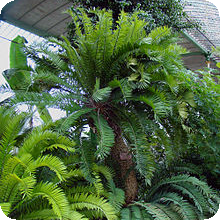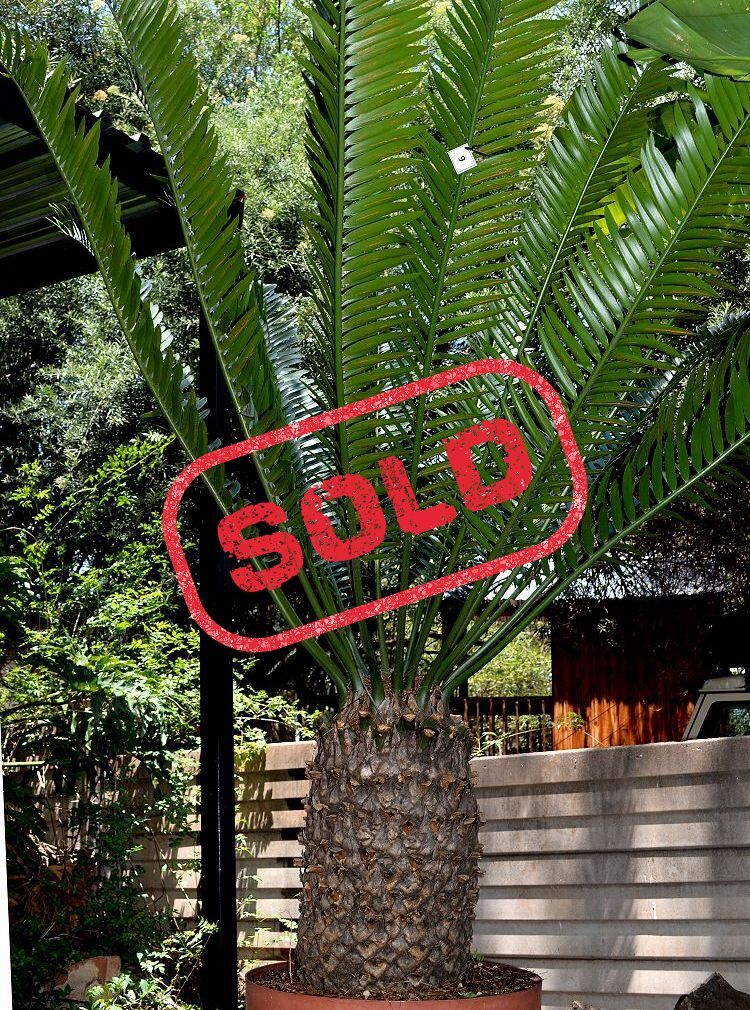|
| Division: Cycadophyta |
| Class: Cycadopsida |
| Order: Cycadales |
| Family: Zamiaceae |
| Genus: Encephalartos |
| Species: E. altensteinii |
Conservation Status: |

E. altensteinii
Eastern Cape Giant CycadEncephalartos altensteinii is a palm-like cycad that is endemic to South Africa. The species name altensteinii commemorates Altenstein, a 19th-century German chancellor and patron of science. It is commonly known as the Eastern Cape giant cycad, umphanga, umguza, isundu (Xhosa) or uJobane (Zulu). It is a very ornamental garden plant and probably the most common of all the cycads in cultivation. This species is long-lived, is easy to grow and in time develops into large specimens.
This cycad grows up to seven meters tall and may be branched or unbranched. The leaves are straight or curved backwards and up to three meters in length. The leaflets are rigid and fairly broad with one or both margins toothed. There are no prickles at the base of the leaf which distinguishes it from E. natalensis. There are usually two to five greenish-yellow cones up to fifty centimeters long, the female scales covered with protuberances. The cones are poisonous to humans. The seeds are scarlet and up to four centimeters long.
Cultivation:
This species is well known as it is easy to grow and adapts to most conditions, provided it has a well-drained growing medium and is not subject to severe frost. Adapts well to full sun or light shade. Because of the eventual size, Encephalartos altensteinii is best suited to large gardens where it can be displayed as a feature plant. When young they can be grown as container plants.
This species transplants easily as a mature plant although it is recommended to remove all of the leaves before doing so, as this makes handling a great deal easier and, most important of all, the plant will recover sooner as less moisture is lost. Good drainage, regular watering and feeding in early summer will help to maintain a healthy plant. Irrigation systems can be detrimental to cycads, damaging the leaves and stems from the pressure of the water, as well as over-watering.
| full sun | green | very low watering | fast growth | frost-resistant | common |
This species is well known as it is easy to grow and adapts to most conditions, provided it has a well-drained growing medium and is not subject to severe frost. Adapts well to full sun or light shade. Because of the eventual size, Encephalartos altensteinii is best suited to large gardens where it can be displayed as a feature plant. When young they can be grown as container plants.
This species transplants easily as a mature plant although it is recommended to remove all of the leaves before doing so, as this makes handling a great deal easier and, most important of all, the plant will recover sooner as less moisture is lost. Good drainage, regular watering and feeding in early summer will help to maintain a healthy plant. Irrigation systems can be detrimental to cycads, damaging the leaves and stems from the pressure of the water, as well as over-watering.
E. altensteinii for sale at AfricaCycads.com:
|
|
|



